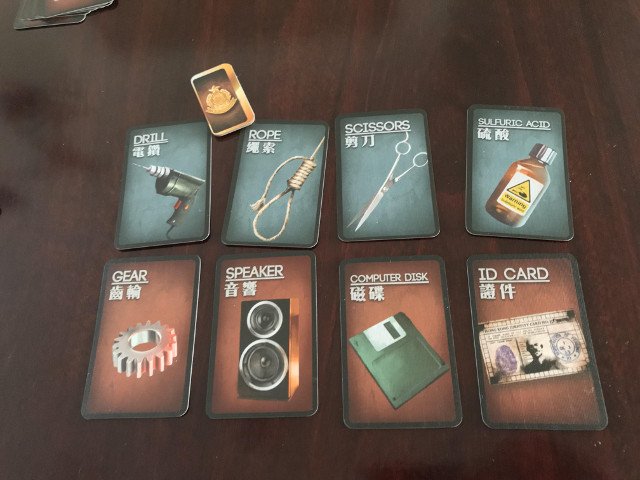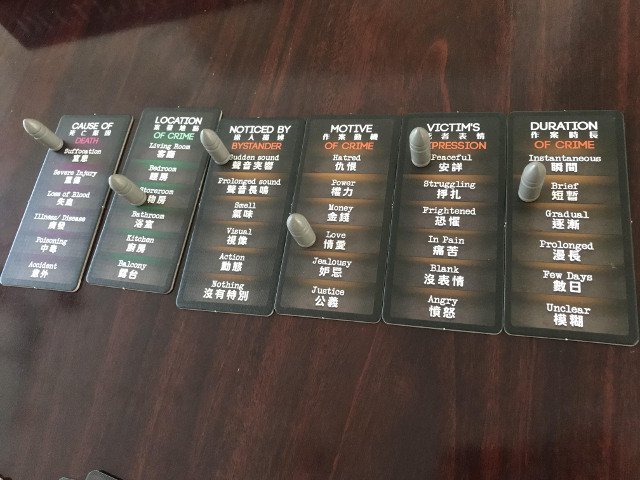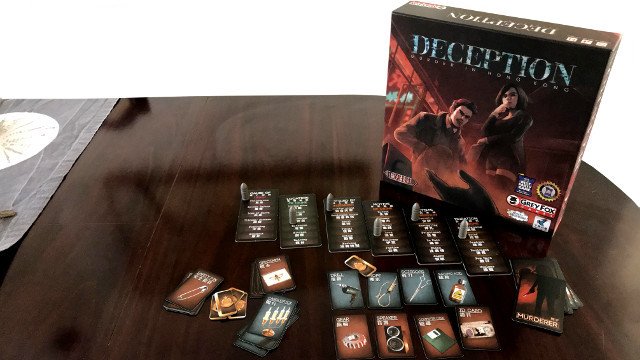Tabletop Corner is a new series in which we’ll be reviewing tabletop games both old and new, covering everything from party games through to new Dungeons & Dragons expansions. Whether you’re a veteran tabletop connoisseur or a newcomer, we’ll feature something for everyone in this brand new GameRevolution column. Enjoy!
It took me a while to pick up Deception: Murder in Hong Kong, which is surprising considering that it exists within my favorite sub-genre of tabletop games. “Traitor” games like Resistance, One Night Ultimate Werewolf, Two Rooms and a Boom etc. have certainly saturated the market, but there’s always an audience for games in which you can stick a knife into your friends’ backs, and I proudly stand among that audience. Deception offers its own spin on this mechanic, introducing an entertaining puzzle-solving aspect that plays out like a surreal game of Clue.
The Setup

Deception: Murder in Hong Kong transforms 4-12 players into detectives, a forensic scientist and a murderer, with the forensic scientist being the only person playing who knows who the murderer is — aside from the murderer, obviously. Prior to the game starting the forensic scientist instructs every player to close their eyes, before asking the murderer to open their eyes and discreetly point towards a “murder weapon” and “key evidence” card out of the eight cards distributed to each player. After this every player opens their eyes, with the detectives then having to solve who the murderer is by way of correctly guessing both the treacherous player and the weapon/evidence they used to dispose of their victim.
Let us know which games you want to see on Tabletop Corner right here!
While the forensic scientist is working alongside the detectives, they cannot communicate who the murderer is (it would be a very short game if this was the case), with them instead placing a wooden bullet upon each the six tiles drawn in the center of the table. These tiles outline things such as the evidence that was left behind at the scene of the crime, the victim’s expression or the cause of death, with them each containing six options to choose from. In order to help the detectives, the forensic scientist should place a wooden bullet upon the most relevant option on each tile, with the detectives then scanning the cards in front of every player in order to determine whether or not they hold a murder weapon or a piece of key evidence that matches with the forensic scientist’s selections.
The Game

As is the case in other traitor games, the job of the murderer is to throw the detectives off their scent as subtly as possible. To help them achieve this, there is also the option to introduce an accomplice into the mix, who works alongside the murderer in order to help them lie their way out of being caught. Each detective can only make one guess each before handing in their badge, and in order to win they must correctly identify both the murderer and the cards they selected at the start of the game. This makes for intense moments, as some of the more over-zealous members of the group I played with were certain that they had correctly identified the murderer in the early stages of the game, throwing in their badge before being forced to sit on the sidelines after they were proven wrong.
The key to success as a murderer in Deception: Murder in Hong Kong is to pick a disparate murder weapon and key evidence card, thus making it more difficult for the forensic scientist to outline the crime in their tiles. For instance, you could opt for a loaf of bread as your weapon, while a whip could be your key evidence, meaning that unless there’s a “BDSM Bakery” location card the scientist will struggle pegging you down. As a result, being the scientist can be a hilariously stressful affair, with you pointing your detectives in the direction of a glass of wine only for them to go sniffing at an innocent player’s electric scooter. There are a huge amount of cards in the game, so it’s unlikely that the same two will be chosen twice, and murderers who are particularly into their role-playing may get a kick out of describing their crime in specific detail after the game is over. How did this victim meet their maker at the hands of a puppet and a pair of ice skates? That’s up to you to decide!
I played with a mixed group of tabletop game veterans and inexperienced players, with the end results seeing the former group running rings around the latter until the entire table descended into chaos. At one point the accomplice accidentally dropped their card on the floor, revealing themselves to the other two detectives in the game, but then still somehow managed to lie their way into keeping the murderer away from being a suspect. As with other traitor games, Deception favors those who are great at lying through their teeth, and it’ll certainly make you feel differently about a few members of your party as you watch them squirm their way out of being caught out.
Should You Buy Deception: Murder in Hong Kong?
Deception: Murder in Hong Kong is a simple but effective traitor game, never failing to entertain and allowing for some downright hilarious moments. While figuring out the murderer is satisfying, the journey to that point is routinely full of surprises, and it’s a compelling experience for both seasoned and new players. If you’re a fan of games such as Werewolf and Resistance, you should definitely pick this one up.
Do you have a tabletop game that you think should be featured in Tabletop Corner? Email Paul.Tamburro@craveonline.com and let us know!







